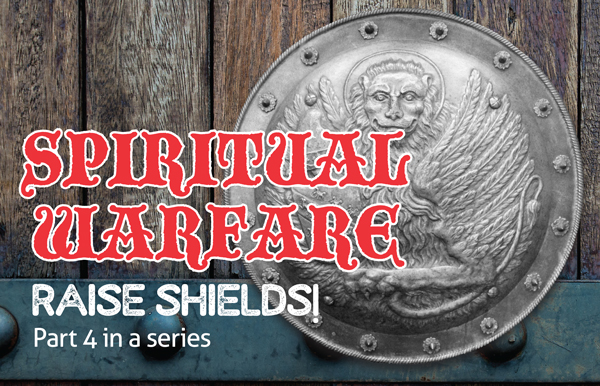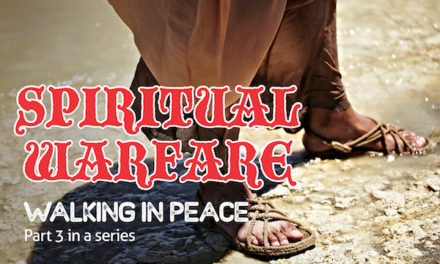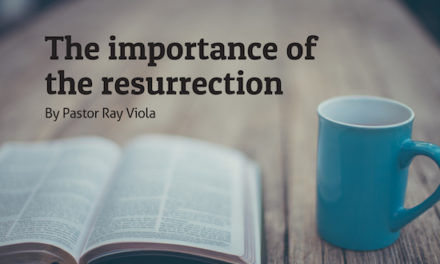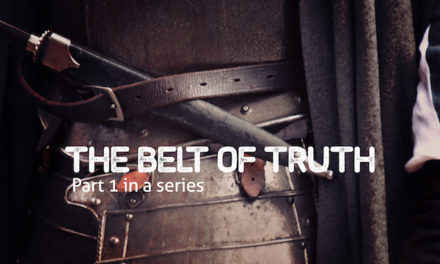…”in addition to all, taking up the shield of faith with which you will be able to extinguish all the flaming missiles of the evil one.” (Ephesians 6:16)
“Having girded (our) loins with truth, and having put on the breastplate of righteousness, and having shod (our) feet with the preparation of the gospel of peace”, as Ephesians 6:14,15 instructs us, does not prevent Satan’s attacks. His fiery darts are temptations to sin and come in various forms of thought – doubts, anxieties, fears, etc. If they are not immediately quenched we will be burned by them because “whatever is not of faith is sin.” (Romans 14:23) That is why we need the further protection afforded by the shield of faith. How important is faith? “For by grace you have been saved through faith; and that not of yourselves, it is the gift of God” (Ephesians 2:8). Habakkuk 2:4 says that “the righteous will live by faith”, and three times this verse is quoted in the New Testament (Romans 1:17; Galatians 3:11; Hebrews 10:38). The flip side of that is, if we’re not living by faith, then we’re spiritually dying! But faith is only as strong and reliable as the object in which it is placed. Therefore, our faith must be in the true and living God because only Jesus can share with us His victory over Satan, sin, and our self (the “flesh”). 1st John 5:4,5 puts it this way: “For whatever is born of God overcomes the world; and this is the victory that has overcome the world – our faith. And who is the one who overcomes the world, but he who believes that Jesus is the Son of God?”
This saving faith both comes from God, and must be centered on Jesus. As Paul explained to the Philippian jailer: “Believe in the Lord Jesus, and you shall be saved.” (Acts 16:31) But saving faith is only the beginning. Paul wrote in his second epistle to Timothy (1:12): “I know whom I have believed”. Notice, he did not write “IN whom”, but “I know whom”. Once we believe IN Jesus for salvation, then we must get to KNOW Him. One way we do this is through learning and obeying His word. The more intimate our knowledge of God, the stronger our faith will be, as Paul indicated as he continued on in the same verse to Timothy: “and I am convinced that He is able to guard what I have entrusted to Him”. In writing about Abraham, Paul gave this account: “with respect to the promise of God, he did not waiver in unbelief, but grew strong in faith …being fully assured that what He had promised, (what God said) He was able also to perform.” (Romans 4:20,21)
“So faith comes from hearing, and hearing by the word of God.” (Romans 10:17) The object of our faith and trust is the almighty, unchanging, and faithful God. It is trusting in His Word, and in His ability and willingness to perform it, that is the “shield” that puts out those fiery darts of the enemy. But if we fail to exercise our faith and thereby fall into sin, this can impact others by weakening their faith. As Paul explained: “we, who are many, are one body in Christ, and individually members one of another” (Romans 12:5), “and if one member suffers, all the members suffer with it” (1st Corinthians 12:26). Conversely, through our interaction with other believers, we can increase in our knowledge of God, and thereby grow in faith. God can also use our exercise of faith in obedience to Him in shielding others (as through prayer). This is implied by the Greek word Paul used for the shield of faith, which pictured a large, rectangular shield for battle (as opposed to the smaller, rounded shield used by the gladiators). This shield was unique in that it not only could be used individually to give personal protection, but it was also meant to be used in tandem with other shields to provide collective protection. The Roman soldiers learned how to hold their shields together to form a barrier around the group and a protective covering over them, which enabled them to stand their ground amidst enemy attack and even advance against their adversary. So too, the Christian faith, although very much an individual and personal relationship with the Lord, is not meant to be an independent, isolated existence. We need one another as Proverbs 27:17 says: “Iron sharpens iron, so one man sharpens another.”
But God is not only the object of our faith, He Himself is our shield! God declared to Abram (Genesis 15:1), “I am a shield to you”. In his farewell blessing to Israel, Moses proclaimed to them that the Lord “is the shield of your help” (Deuteronomy 33:29). Over and over again in the Psalms, David declared the Lord as his shield: Psalm 3:3 – “But Thou, O Lord, art a shield about me”; Psalm 18:2 – “The Lord is my…shield”; Psalm 28:7 – “The Lord is my strength and my shield; my heart trusts in Him”. And Proverbs 30:5 says: “He is a shield to those who take refuge in Him.” The NIV translation of 1st Peter 1:5 states that we “through faith are shielded by God’s power until the coming of the salvation that is ready to be revealed in the last time.” That’s certainly comforting to know!






